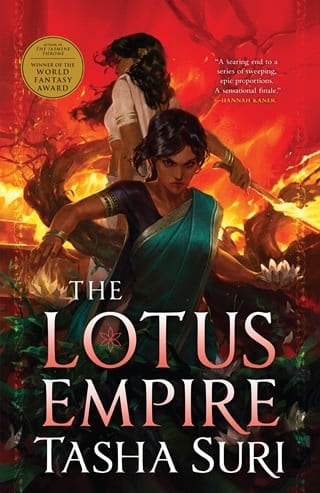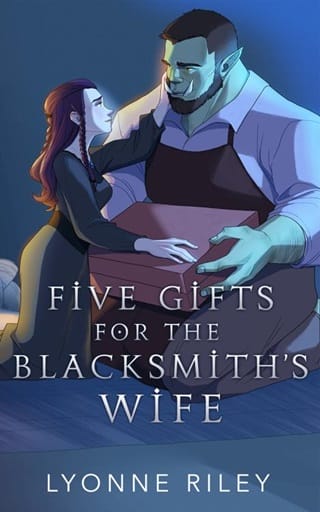Chapter 12 Arahli Ara
ARAHLI ARA
The forest was burning, and Arahli Ara was not afraid. He was exultant.
To be yaksa was to be part of green—enmeshed in its trees, its water, its deepest roots—and yet vaster. He kneeled at the zenith of the Hirana with his kin, the sunlight painting their bodies in golden light. But his will, his self , extended far beyond the limitations of his body. He was not the leaves that haloed his skull, or the striations of lustrous wood that braided his bones. He was also not the Ahiranyi trees that cracked and splintered from the heat below them as arrows wreathed in fire thudded into their marrow. But he watched through those trees as they burned, listened through falling branches and rotting wood to the cries and yells of mortal men. The heaving Parijatdvipan army swarmed helplessly on Ahiranya’s border, as faceless and insignificant as ants.
They amused him.
The fire could not hurt him or his kin. He and his kin had laughed when they had felt the Parijatdvipans approach with their churning chariot wheels, their false fire.
The Parijati are not what they once were , his kin Taru Ara had whispered days before as their worshippers had bowed before them on the Hirana, pressing their faces to the cold stone, offering up gifts of flowers and fruit and golden coin, begging for safety from the coming army. Even our own worshippers are less than they once were. Look how they crawl, my dear one. Look, sweet one, how they beg. She’d clasped his hand with her own. Her skin had been cold, soothing as sap. They do not understand how to kill us anymore.
She had been right. He and his kin had changed under the earth and returned stronger, while humans had only grown smaller. He could feel the shared power of his kin now, rich in the sangam, rich inside him. Mani Ara had made them strong enough to survive anything.
Thinking of Mani Ara led him back to Priya, as easily as any sun-seeking green thing rooted in soil. He could feel her now, in the same green that held him—moving through the forest with her magic, twisting the traps she’d set into the soil to catch unwary warriors. She snapped limbs and throats easily, beautifully.
She moved like Mani Ara once had, as keenly as a knife, as strong as a storm.
What a vicious thing Priya is , he thought.
But then, she always has been. Even when she was small—
He quashed that thought like an insect. It was not his thought, and it had no place in his skull now.
He was not Ashok.
He met Taru Ara’s eyes, and for a moment it was Ashok’s vision that clouded his own. Sanjana’s face stared back at him. Her mouth shaped into a smile.
“Dear one,” she said—and that was not long-dead Sanjana’s voice, but Taru Ara’s wood-flecked rasp. He saw the solidity of her face—the curves of wood and stone—and felt comforted. She was not flesh. “She is growing stronger.”
“Fear is a great teacher,” he said. His other kin listened, liquid eyes unblinking.
“ I am a great teacher,” Taru Ara corrected.
Taru Ara was the one Priya had gone to in desperation, in fear, begging for the strength to protect Ahiranya. It was fear—and love—that had made Priya willing to reach for Mani Ara, to reshape herself. It was Taru who had given her the crown mask, so Priya would continue to change, growing stronger, nourished by its magic. He could not deny her role in making more of Priya than she had been.
He inclined his head in agreement. His kin’s smile deepened.
“Next time she needs guidance, I leave it to you,” she said, indulgent. “I know how you love your temple children.”
He did not want Priya to be placed into his keeping, but he did not say so.
He saw Taru Ara’s smile falter half a second before Arahli himself sensed Priya waver, flickering like candle flame. In the forest, in the marrow of a great tree, he felt a blade of fire pierce through wood—and felt her agony in its wake.
The blade sank deep into the tree, and Priya’s presence among the trees extinguished, returning to the embrace of the sangam.
Something akin to a heart clenched its root-thick veins in his chest, pulsing with sluggish sap.
She is still too weak. Too human.
More arrows thudded into the trees, and Parijati soldiers raced into the forest, hacking through the green as they went. Waiting Ahiranyi warriors were caught under their blades. Blood reddened the soil, drowning it in its richness.
His kin, in their circle, hissed displeasure, rage unfolding inside them alongside his own. He was angry . At Priya, for hollowing so slowly—and at the Parijatdvipans for their temerity.
He felt his kin’s rage stretch into the green, a furious tumult of churning soil and barbs rising from the ground to spear those men through. Ahiranyi or Parijati, it did not matter. Taru Ara rose to her feet, no longer smiling. At her left, Vata Ara’s eyes sharpened.
“Do not,” he said. But she bared her teeth, her sharp mouth a warning.
“I have not known war in so long,” she said. “I would have their blood just once.”
And then she was gone.
She was not the only one who fled. He did not intend it, no, but he found himself standing. His mouth tasted mortally of blood—the taste of fear. He could not remain where he was.
Arahli Ara descended the Hirana and raced to Priya’s side.
She lay in her carapace of thorns at the base of the Hirana. Pilgrims were huddled around the thorns, but they scrambled away, bowing as they did so, when he strode toward them.
He ignored them. His fingers of wood-and-bone motioned like a knife through the air, and in answer the shell splintered open. He kneeled.
Her eyes were shut. She did not react when he clasped her shoulders, lifting her upper body from the ground beneath her to rest in his lap. She was not sleeping, not dreaming—her soul was safe in the sangam, cradled by cosmic waters. He had known she was. But he could not help but press a hand to her torso. She had believed for a moment that she was the tree, that her body had been stabbed through, and he half believed it himself.
He knew what it was like to be human. The pain of it, the fragility of flesh.
The skin beneath his hand was unharmed.
He looked at her face. Her closed eyes.
If she looks at me , a voice in his mind whispered, I will remember what it means to be flesh .
Horror wrapped itself in tendrils through him.
He had not been near Priya since her time beneath the Hirana, when she had kneeled and prayed and splintered, seeking Mani Ara. And this was why he had avoided her, in truth: She made something mortal rear up in him.
For a time he had believed himself to be Ashok. He had laughed and hated as Ashok did—had acted with Ashok’s interests. He had sent Bhumika away as Ashok, gifted with her knowledge, in a desperate attempt to hold those last threads of humanity. He knew now what he truly was, but he still saw the mortal faces on his kin, and felt Ashok whisper in his skull; he feared what festered within him still.
But he could not avoid his responsibilities to Priya, or to his kin. She would need to be taught. She would need to grow stronger than her pitiful mortality. She was a temple elder, their only temple elder, and Mani Ara’s beloved. For his kin, he would reduce her to nothing but her worship and her bones.
The remnants of Ashok that still lingered within him faded once more. He laid Priya back down upon the grass, stood, and turned, following the path Taru Ara had walked, toward dark trees and golden fire.
He would kill a few Parijati himself and string their bodies upon the trees like a garland. A fitting welcome and farewell for their unwelcome guests.
 Fullepub
Fullepub 



